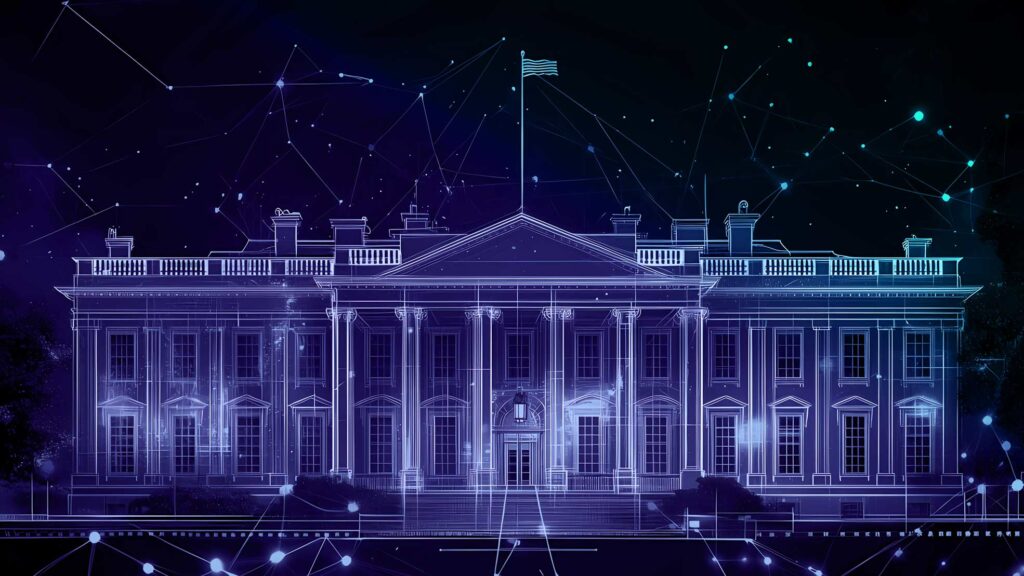August 14, 2024
By JB Ferguson, Head of Capstone’s Tech, Media, and Telecom Practice
Capstone believes Vice President Kamala Harris, as president, will adopt a more tech-forward policy focus than President Biden. With her California background, she is well-versed in tech issues, including social media and the gig economy. Once in office, we expect Harris to accelerate artificial intelligence (AI) initiatives, take a softer stance on tech mergers, while still aligning with the Biden administration’s overall approach to the sector.
What Harris Has Said About Tech Policy
- Continuation on AI: Harris’ office was heavily involved in developing the administration’s approach to AI, resulting in Biden’s executive order (EO). The EO uses the Defense Production Act (DPA) to mandate that foundation model developers, such as Google (GOOGL), Meta (META), and OpenAI, to notify the federal government when training models over a certain size and report adversarial testing (“red-teaming”) results.
Harris was also critical in securing voluntary commitments from the largest developers of foundation models to further invest in security testing, develop standards for identifying AI-generated content, and publicly report models’ capabilities and limitations.
At the UK-hosted “Global Summit on AI”, Harris focused on individual-level AI dangers, highlighting algorithmic discrimination and deepfakes as serious personal risk, comparable to AI-enabled cyber attacks and advanced weapons development.
- Traditional tech issues: Harris has typical moderate Democratic views on technology company regulation. As California Attorney General, Harris sued eBay for anticompetitive ‘no-poaching’ agreements with Intuit and created a dedicated privacy office under her purview. Notably, she has been silent on tech antitrust, and has links with Uber (where her brother-in-law is Chief Legal Officer), Meta, and other big tech companies. We think her likely antitrust appointments, lesser (relative to Biden) obligations to the progressive wing of the party, and timing considerations for FTC appointments suggest relaxed view towards merger activity.
We expect Harris to focus on the intersection of tech and data privacy issues in particular. As AG, she persuaded major social media platforms to take meaningful steps against revenge pornography, and prosecuted the executives of Backpage.com for advertising adult services. The Backpage case led to the passage of the controversial SESTA/FOSTA modifications, which had bipartisan support, to platform immunity under Section 230 of the Communications Decency Act. We believe privacy will likely to be a component of Harris’s focus on post-Roe protections of access to reproductive healthcare.
- TikTok: Harris has made efforts to distinguish between US national security concerns about China-based tech firms like TikTok and her views on the app itself. Harris noted on the TikTok bill that, while there are national security concerns about the company’s owner, there is no intention of banning TikTok.
Where Harris Differs from Biden
- Immigration: As a senator, Harris introduced a bill to remove per-country caps for employment-based green cards to address the more than a decade-long backlog of applications from H1B and other work visa holders. Harris has been silent on H1B reform, but we anticipate her favorable stance towards big tech suggests support for increasing visa grants for highly skilled applicants in top categories. Simultaneously, she is likely to continue the Biden administration’s reforms targeting “gaming” of the H1B system.
- Cybersecurity: We believe Harris is likely to be more proactive on cybersecurity issues than Biden while following through on the 2021 cybersecurity EO. As senator, she introduced the Secure Elections Act (SEA) with bipartisan support, which would have created a cybersecurity framework and grant program for state election administrators. Additionally, she has expressed interest in the bigger issue of when a cyberattack amounts to an act of war, outlined in her 2019 biography, The Truths We Hold.
Key Priorities for any Democratic Administration
- Content moderation for children: A major weakness for social media platforms in the US regulatory environment is the potential harm to underage users. A Democratic administration will likely address this with restrictions on addictive design patterns and mandatory parental controls, either through new legislation, such as the Kids Online Safety Act (which passed the Senate on July 25, 2024) or an expansive interpretation of existing online child protection law.
- Privacy: Although privacy legislation appears stalled, we believe this impasse provides motivation for the Consumer Financial Protection Bureau’s (CFPB) pending updates to its rule enforcing the Fair Credit Reporting Act, targeted at restricting data brokers. The rule would significantly expand the definition of a credit report to include identifying data sold by large adtech providers like LiveRamp (RAMP), increasing exposure for affected companies to enforcement and class action risk. We believe the impact of the rule, which has yet to be formally proposed, is still underappreciated by the market.
- Navigating a dysfunctional Congress and an oppositional Supreme Court: A Democratic trifecta with a supermajority in the Senate is an unlikely outcome. We believe in any other circumstance, a Democratic administration will be forced to pursue their policy goals through rulemaking. In the wake of Chevron’s overturning, that task will be even more difficult.

JB Ferguson, Head of Capstone’s Tech, Media, and Telecom Practice
Read more from JB:
The Coming Tech Policy Escalation and Questions for the Balance of 2024
Progress Towards Artificial General Intelligence Will Scramble Tech Regulation
AI Wars to Heat up: Why the US and EU Will Escalate Their AI Trade War, and Why it Carries Underappreciated Risks



























